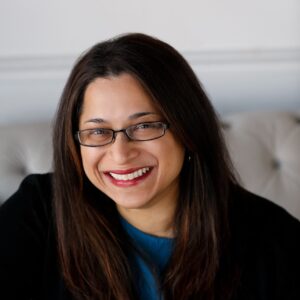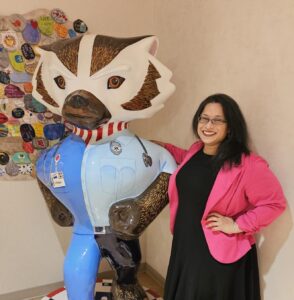
Sharon D’Souza, MD, MPH is a former Magnetic Resonance Imaging and Breast Imaging fellow. Currently, Dr. D’Souza works at Tulsa Radiology Associates in Tulsa, Oklahoma, where she combines her clinical practice with a passion for patient advocacy.
What career milestones have you achieved since your time at UW–Madison?
I’ve kind of carved my own path a bit. I work in a private practice and am involved with political activism and advocacy, and physician grassroots efforts. It’s not quite private practice and not quite academic, it’s a little bit hybrid.
I’m a founding member of Physicians for Patient Protection, and very active within that group. Initially, we were physicians working independently to advocate for physician-led care; and we found each other and connected on social media. In 2018, we organized a trip to Washington DC to speak with legislators, and in 2023 we became an official 501(c)(3) nonprofit organization.
I’m currently the president for the Oklahoma State Radiological Society, and on the board for the Oklahoma State Medical Association and the Tulsa County Medical Society. I think it’s very important to be involved in all of these groups. Through this involvement, and my committee council activities with ACR [American College of Radiology] and SBI [Society of Breast Imaging], you tend to hear early about things brewing and can help translate that to physician involvement, getting the word out and tapping different connections to coordinate what’s needed — here’s where we need to write letters, here’s where we need to show up, and that kind of thing.
As physicians, we’re bombarded with responsibilities and there’s so much that there’s often not enough time for everything. I think it is important to try to make a little time because as much as we help patients in the reading room, we need to step out and look at the big picture. That’s what radiologists do, we look at the big picture. We’re the doctor’s doctor. We’re responsible for seeing everything on our image and can’t just focus on the one thing that they ask, you’ve got to look at everything.

How would you say your training at UW–Madison has helped you in your career?
I got excellent training, so that helped me take care of patients in that way. I made a lot of wonderful, lifelong friends here. I attend conferences and see folks from UW–Madison and we meet up routinely.
I also had wonderful mentors and resources, like the Women Professionals in Radiology group that was started by Elizabeth Sadowski, MD; Susan Rebsamen, MD; Lynn Broderick, MD; Donna Blankenbaker, MD; and Elizabeth Burnside, MD, PhD. That was a really great way to make lifelong friends and find mentorship. Those connections make visiting Madison feel like coming home in a way.
Do you have a favorite memory of your time here?
I’m from Oklahoma, but I’m not a huge football fan. One of my best memories is going to a UW football game with an attending and two other fellows. I got all dressed up in the red and white and remember being in the stands and cheering along with the crowd. Even though I’m not into football, it was a really fun time and nice to spend time with colleagues outside of the hospital.
What advice would you share with current and future trainees?
I would say make sure you take the time to look outside the reading rooms. You’re getting expert training at Wisconsin but it’s a very big world out there, and there are many ways you can help your patient.
If you narrow your focus to just the reading room, you’re missing out on so much that deeply affects how you practice medicine. There are very few physicians in legislature and in congress, and these people are making decisions that impact our practice. If you’re not actively involved, other people are just going to keep making decisions about how you practice medicine, and they have no idea what we do on a daily basis or how this affects us.
I know sometimes with advocacy people may be a little intimidated, or unsure of how to get involved. Reach out to your local medical societies, your state medical associations, they are always looking for people. It’s like walking into an ice cream shop, there’s a million flavors and not one flavor is right for everybody. There’s so many things you can do. You can donate time, donate effort, donate money depending on what works for you.
It’s also helpful to find a buddy. It can be intimidating to talk to legislators, but it shouldn’t be. We are the medical experts, we are the ones who should be talking to them, not somebody else trying to speak for us.
A lot of it is about consistency, it’s about repetition, it’s about staying in contact with those people who are supposed to be representing us.